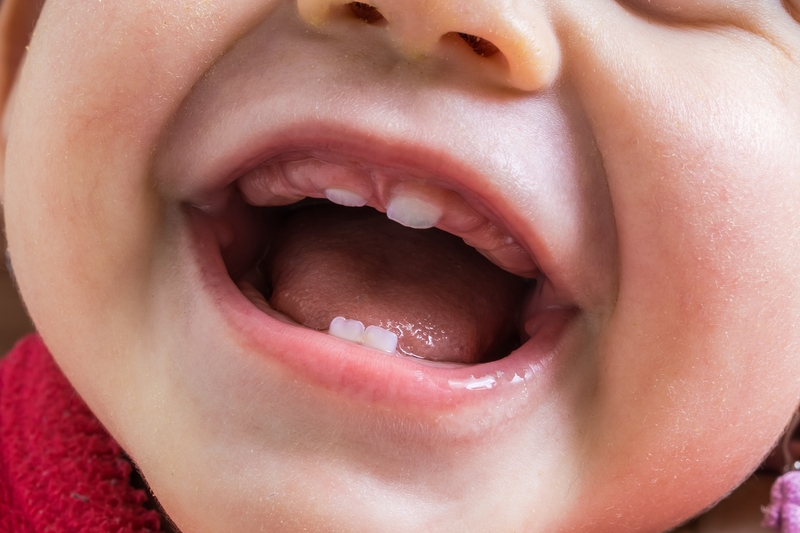Oral Milestones in Your Child’s Life
Preventing Baby Bottle Tooth Decay
February 1, 2018Why the Baby Teeth Are Important
February 20, 2018
People are not born with a full set of teeth in their mouth. Like anything else, a person has to develop their baby teeth over time. Even then, a person will lose those teeth to make way for the permanent teeth. Some children begin to show teeth only a few months after birth, while other children may not have teeth for a couple of years. The adult teeth will also come in at different times and will need help of their own to come in straight. There are many oral milestones in a child’s life as their mouth and jaw grows through the years. Even in the teenage years the mouth is changing and can continue to change all throughout life. Learn more about your child’s developing mouth and how it changes through the years!
Oral Milestones in Your Child’s Life
Did you know that the adult mouth is very different than a child’s mouth? An adult will have 32 teeth that are large and fill up the mouth. However, a child will only have 20 teeth, and those baby teeth are smaller, more delicate, and more spaced out. Infants are not born with teeth, but develop them over time. Their jaws continue to grow all throughout childhood, with those 20 baby teeth spacing out the mouth to make way for adult teeth later on in life. Children will have baby teeth for several years, and will begin to lose them before they are teens. Teenagers will then have their permanent teeth that will stay with them throughout life.

Newborns Up to 6 Months
Every child is different, so every child will have their teeth erupt at different times. Some infants will have teeth very early at 3 months, while other children won’t have their first tooth until they are 1 year old or older. It all depends on genetics. When looking for a first tooth, look at the bottom jaw. The bottom two teeth erupt first in most babies, followed by the top 2 teeth. Your child may take many months just to get these 4 teeth, but should have most (if not all) of their teeth by age 3.
6-36 Months in Toddlers
If your child doesn’t reach oral milestones in tooth eruption, make sure that they visit the dentist. We offer a free first visit for infants 18 months and younger. The American Academy of Pediatric Dentistry recommends that children be seen for an exam as early as 1 year of age. They should also see a dentist within 6 months of their first tooth erupting so that a dentist can determine if they are hitting oral milestones and avoiding tooth decay early-on. Between 6 and 36 months, your toddler will be teething. It can even happen earlier than this time, but if they don’t have teeth by age 3, that is a sign of an oral health problem. As soon as that first tooth pops through, make sure you are brushing it with an infant brush and cleaning your infant’s gums after every time they eat. Even that one little tooth can get tooth decay!
Children’s Oral Milestones
Children should be hitting all tooth eruption oral milestones and should get all their baby teeth during their childhood years. However, those baby teeth only stick around for a short time. The teeth will begin falling out between ages 6 and 14, but some children will have some fall out sooner or later. The American Association of Orthodontics recommends that children have their first orthodontic visit between the ages of 7 and 8.
This is a time to prevent bite and alignment issues and for children to get braces if they need them. If children get braces, they will likely have braces again around age 11 or 12 or later. At that time, a child should be hitting oral milestones of getting in their permanent teeth. Once the permanent teeth come in, teens generally receive braces to straighten their teeth. This can take between 18 and 24 months, but should give them a straight smile that lasts a lifetime.

Adults and Beyond
You won’t see too many changes in your smile as an adult. As an adult, the oral milestones you should strive to hit are biannual dental exams and cleanings and avoiding tooth decay. Adults have a high percentage of tooth decay and gum disease, but that could also be because adulthood takes up so many years of your life. By the numbers, tooth decay is still the most chronic disease in adults (just like in children). Gum disease is also very prevalent in adults, as 64.7 million adults (only in the U.S.) have gum disease. 8.7% have mild gum disease, while 30% have moderate and 8.5% have severe (which means tooth loss).
If you see changes in your oral health, it’s due to oral health problems or age. As you age, your teeth naturally shift over time. That means, even if you had orthodontic treatment as a teenager, your teeth might be crooked as an adult. Wear a retainer throughout the years to prevent that shifting. Many seniors experience tooth loss as they age. This is a normal occurrence in many people, but there are actually millions of senior citizens that still have their natural teeth. That’s because those teeth have been well taken care of through the years. To keep your teeth longer, take care of them through proper oral hygiene habits!
Meet Oral Milestones with Ease
In babies, oral milestones can be unpredictable depending on genetics. However, there are oral milestones around certain ages that your child should be hitting. If they are not hitting those oral milestones, set an appointment with Dr. Hardy to have your child’s teeth examined. Children should visit the dentist regularly just like adults. Make sure your child gets their bi-annual dental cleanings and exams by calling Hardy Pediatric Dentistry & Orthodontics at (720) 887-6003!